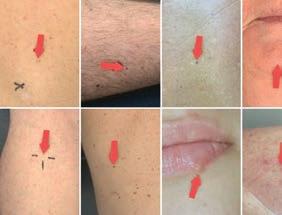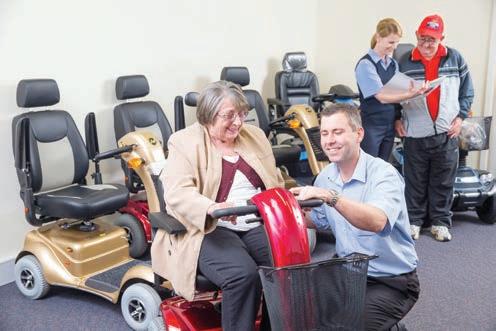
5 minute read
HEALTH
MELANOMA is among the top five causes of cancer death in Australia, claiming one life every five hours.
In fact, Australia leads the world in skin cancer cases, with around 800,000 diagnoses each year yet, 71 per cent have not had the recommended skin cancer check in the past year, and 39 per cent have never had a professional check.
Advertisement
“Many Australians don’t understand their risk of skin cancer, including potential deadly melanoma,” says Dr Alvin Prakash at the National Skin Cancer Centres.
“Skin cancer can affect anyone, occur anywhere on the body, and show no symptoms until an advanced stage. That is why it is so important to be aware of your own skin cancer risk.”
Ninety per cent of those diagnosed with skin cancer are over age 40. The risk is higher for anyone who has ever been severely sunburnt, used a solarium, worked outdoors, or had skin cancer before.
Other high-risk groups include people with multiple moles, fair skin or skin that burns easily, or light-coloured hair or eyes.
For the earliest skin cancer detection total body photography/mole mapping is recommended for these high-risk groups.
Melanoma can also run in the family. If your parent, sibling, or child has had melanoma, your own risk increases by 50 per cent. Men have a 60 per cent greater chance of developing the disease.
Experts recommend an annual head-to-toe skin cancer check, as picking up small changes early can significantly improve chances of successful treatment. In fact, 99 per cent of skin cancers are curable if detected and treated early.
“Early detection through regular full-body skin cancer checks is the best defence,” says Dr Prakash. “Our mission is to detect skin cancers in the early stages to minimise complex, invasive, and expensive treatments, and ultimately save lives.”
Visit skincancercentres.com.au
TGA CALLS FOR PHILIPS CPAP MACHINE RECALL
THE Therapeutic Goods Administration has announced that a large number of Philips ventilators and positive air pressure machines – also known as BiPAP or CPAP – need to be repaired.
Some machines manufactured before April 26 this year contain sound-muffling foam that may break down and be inhaled when the machine is being used.
“If your machine is one of the affected models, you should speak with your sleep doctor or GP about whether or not you should keep using your machine,” Australasian Sleep Association president Associate Professor Alan Young said.
Positive air pressure devices are used to treat sleep apnoea, keeping a patient’s airway open at night and allowing them to function properly during the day. Ventilators are used for people with shallow breathing due to lung disease or muscle weakness.
“Patients really rely on these machines to keep them feeling well and productive and in some cases to keep them alive. It’s very important that you discuss your individual situation with your sleep doctor or GP and continue to use your machine until that time.”
Symptoms that patients might experience from affected machines include headache, irritation of eyes, nose, airway or skin, cough, chest pressure, nausea/vomiting and sinus infection. Visit philips.com/src-update ONE in every four Australian’s suffers from incontinence, yet this debilitating disorder is a taboo subject best avoided.
It is estimated that more than 5 million Australians have some form of incontinence, and according to the Continence Foundation of Australia, this is projected to rise to 6.4 million by 2030, making one of the biggest health challenges also the least talked about.
Statistics show that up to 38 per cent of females suffer from urinary incontinence and bladder leakage.
It affects 1 in every 10 men and 1 in 3 women who have given birth. About 70 per cent suffer in silence, too embarrassed to seek medical advice and treatment. It is a condition that stops sprinting, jumping on trampolines and laughing, for fear of a leak.
But help has arrived. Medical equipment manufacturer BTL has developed a painless, non-invasive, discreet and easy treatment – the Emsella chair which uses radical new high-intensity focused electromagnetic (HIFEM) technology to stimulate the entire pelvic floor to mimic over 11,000 pelvic floor supramaximal contractions in one 28-minute session.
The breakthrough technology has been clinically and scientifically proven to work for the treatment of all forms of urinary incontinence (stress, urge and mixed), light bladder leakage or a weak pelvic floor due to body aging, childbirth or menopause.
The treatment is also available for men with a weak pelvic floor and urinary incontinence. The stimulation gives regained control over pelvic floor muscles and bladder. The patient simply sits fully clothed on the chair for six sessions over three weeks.
The contractions re-educate the pelvic floor muscles that provide vital support to the bladder and other organs. To find a provider visit btlaesthetics. com/au/btl-emsella
BLOOD PRESSURE GOES UP FOR WOMEN
HIGH blood pressure or hypertension is becoming more prevalent among Australian women, particularly those aged 55 years and over.
A normal blood pressure level is less than 120/80 mmHg.
Blood pressure varies from person to person and can fluctuate throughout the day based on activities, but consistently having measures above normal may result in a diagnosis of high blood pressure or hypertension.
The higher the blood pressure level, the greater the risk of developing other health problems, such heart issues and stroke.
As women age, they may be more at risk of developing high blood pressure than men of a similar age.
Researchers have observed physiological differences in the cardiovascular systems of women, which include types and levels of hormones involved in regulating blood pressure.
Some of the warning signs and symptoms of high blood pressure and hypertension include severe headaches, nosebleed, fatigue or confusion, vision problems, chest pain, difficulty breathing, irregular heartbeat, blood in the urine, and pounding in your neck chest and ears.
Lifestyle factors that can help regulate high blood pressure include a diet high in potassium, moving more, controlling weight gain, keeping a lid on alcohol and quitting smoking. Visit: bloomsthechemist.com.au/ blood-pressure-evaluation
GREAT
WINTER SPECIALS
We provide the following FREE services:
• In-home demonstration and trial • Delivery to your home • In-home Warranty Service • QLD Transport
Number Plates • Price Match
Guarantee*
GREAT SPECIALS on the following SCOOTERS
SALE SALE SALE
Luggie Standard Portable Mobility Scooter
Retail Price: $4190
Sale Price
Only $3990
ENQUIRE NOW Merits Interceptor S940A-S2 Scooter
Retail Price: $7800
Sale Price
Only $6990
Monarch Telsa ll All-Terrain Mobillity Scooter
Retail Price: $5400
Sale Price
Only $5190
ENQUIRE NOW ENQUIRE NOW











